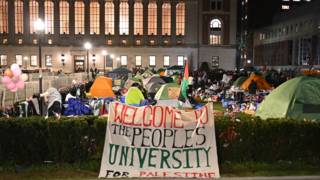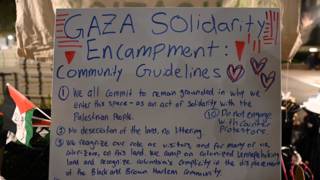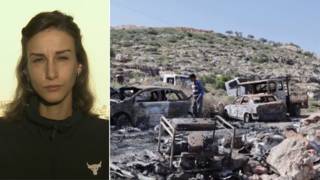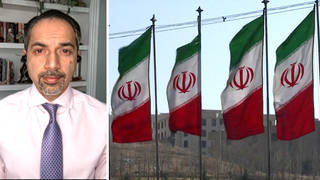
Related
Topics
Guests
- Trita Parsifounder and president of the National Iranian American Council. His book is A Single Roll of the Dice: Obama’s Diplomacy with Iran.
Talks over a nuclear deal with Iran are in their final stages before Tuesday’s self-imposed deadline. Progress has been reported on several issues, including limiting centrifuges at Iran’s main nuclear facility to around 6,000. But Iran has reportedly backed off a key pledge to enrich its atomic fuel overseas. Iranian officials are said to have previously agreed to sending uranium stockpiles to Russia, but now want to keep the fuel inside the country. The demand could still be overcome by agreements on regular inspections and sufficiently diluting the fuel. If a preliminary deal is reached by Tuesday, a final agreement would follow by the end of June. From the Swiss city of Lausanne where the talks are underway, we are joined by Trita Parsi, founder and president of the National Iranian American Council.
Transcript
AMY GOODMAN: We turn to talks over a nuclear deal with Iran, which are in their final stages before Tuesday’s self-imposed deadline. Progress has been reported on several issues, including limiting centrifuges at Iran’s main nuclear facility to around 6,000. But Iran has reportedly backed off a key pledge to enrich its atomic fuel overseas. Iranian officials are said to have previously agreed to sending uranium stockpiles to Russia, but now want to keep the fuel inside Iran. The demand could still be overcome by agreements on regular inspections and sufficiently diluting the fuel to ensure it cannot be used for a bomb. The talks continue in the Swiss town of Lausanne today. If a preliminary deal is reached by Tuesday, a final agreement would follow by the end of June.
For more, we go to Lausanne, where the talks are underway, to Trita Parsi, founder and president of the National Iranian American Council. He’s the author of A Single Roll of the Dice: Obama’s Diplomacy with Iran.
Can you tell us, in this last 24 hours of this self-imposed deadline, where the talks stand, and has Iran pulled back on one of the key negotiating points?
TRITA PARSI: Well, there’s a lot of brinkmanship that is going on right now, both from the Iranian side as well as from other sides in the negotiations. For instance, the Russian foreign minister, Sergey Lavrov, has confirmed that he’s leaving Lausanne, but that will be back if there is a deal. And this is also a way to put pressure, but this time on the Iranians. There is a lot of brinkmanship, and there is an air of inevitability that there will be a deal, combined, paradoxically, with the tremendous amount of uncertainty.
AMY GOODMAN: Explain the reports of what Iran has reversed on, this issue of sending the stockpile to Russia. Explain what this is about.
TRITA PARSI: This is very critical, actually, because if the Iranians retain the stockpile on their own soil, that dramatically changes the calculations when it comes to the breakout capability, which is the amount of time the Iranians would need in order to make a decision to build a bomb and actually be able to have enough material for that bomb. So, this is a big announcement, or course. And I think, at the end of the day, we should view it from the perspective that there is a lot of brinkmanship going on. I think the reason why the Iranians are doing it is because of this.
The Iranians have, in general terms, accepted the demands that the U.S. has asked of them. What they have not accepted is what the U.S. is offering in turn. And by sending this signal that they’re walking back on something that they essentially had accepted that they would give, they’re essentially saying they’re not getting enough in return from the United States. And what they’re referring to there, of course, is sanctions relief. So, if you want a deal without giving as much sanctions relief, you’re going to get less. But at the end of the day, I think the Iranians will accept shipping out part of that stockpile, at a minimum, but only if they manage to get some of their demands met, as well.
AMY GOODMAN: And right now, the Israeli prime minister, Netanyahu, says the deal that’s about to be reached—and, you know, it’s been revealed that they were spying on the talks and then shared some of that with the Republican lawmakers when Netanyahu came and addressed the Congress—that the deal that’s about to be reached is the worst one ever, or the worst one that has been considered. Your response to this, Trita Parsi?
TRITA PARSI: Well, I mean, essentially, the Israeli prime minister admits that he was wrong in the past when he was extremely panicky and scaremongering, that he actually should have been even more panicked about the situation. By now, this is essentially just background noise, because the Netanyahu government, because of the way they have acted, have made themselves outside players and quite uninfluential on what is taking place in the talks right now. And in that sense, what they have done has been quite a disfavor to the Israeli state, because they have been—there’s been so much animosity and aggression against the Obama administration that they’ve essentially neutralized themselves.
AMY GOODMAN: Finally, Trita, you have just written a piece in The Atlantic headlined “Why Iran’s Supreme Leader Wants a Nuclear Deal,” talking about the ayatollah. Why does he want one?
TRITA PARSI: I think what has been widely misunderstood in the U.S., in particular, is that there’s been this belief that the supreme leader is an ideological opponent to the idea of a deal with the Unuted States. He’s a skeptic, without a doubt, but part of the reason I think that he’s looking favorably towards a deal that he can live with right now is that it will be the first time in 200 years that the Iranians have had a major dispute with the West or the great powers and that it ended up with a negotiation in which the Iranians did not lose. It doesn’t mean that the U.S. lost. But he meant that Iran has managed to get the other great powers to the negotiating table, and the end result is a mutual compromise rather than Iranian capitulation. That act is, frankly, a first for any country in the Middle East.
AMY GOODMAN: Trita Parsi, we want to thank you very much for being with us, founder and president of the National Iranian American Council, his book, A Single Roll of the Dice: Obama’s Diplomacy with Iran. Again, the deadline, self-imposed deadline, is tomorrow, and, of course, we’ll continue to follow developments. Trita was joining us by Democracy Now! video stream from Lausanne, Switzerland.












Media Options